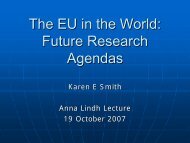Programm - Institut für Europäische Politik [IEP]
Programm - Institut für Europäische Politik [IEP]
Programm - Institut für Europäische Politik [IEP]
You also want an ePaper? Increase the reach of your titles
YUMPU automatically turns print PDFs into web optimized ePapers that Google loves.
The EU's Foreign Policy – how to forward internal<br />
unity and external strength? Views from<br />
Germany, Poland, Nordic and Baltic countries<br />
<strong>Programm</strong>e<br />
30 – 31 May 2011<br />
Organized by the Stockholm International Peace Research <strong>Institut</strong>e (SIPRI), the Swedish<br />
<strong>Institut</strong>e of International Affairs (UI/SIIA) and the <strong>Institut</strong> für Europäische <strong>Politik</strong> (<strong>IEP</strong>).<br />
Venue: UI/SIIA, Drottning Kristinas väg 37, Stockholm<br />
The Ministry for Foreign Affairs of Sweden and the Ministry for Foreign Affairs of<br />
Germany are gratefully acknowledged for funding this seminar.<br />
Monday 30 May 2011<br />
12:45 Registration opens<br />
13.00 Light lunch<br />
14.00 – 14:30 Welcome and introduction<br />
Anna Jardfelt, Director, Swedish <strong>Institut</strong>e of International Affairs<br />
(UI/SIIA), Stockholm<br />
Helmut Rudolf Kulitz, Research Coordinator, Policy Planning Staff, Federal<br />
Foreign Office, Berlin<br />
Peter Ericson, Deputy Director General and Head of the Security Policy<br />
Department, Ministry for Foreign Affairs, Stockholm<br />
Prof. Dr Mathias Jopp, Director, <strong>Institut</strong> für Europäische <strong>Politik</strong> (<strong>IEP</strong>), Berlin
14.30 – 16.15 Session I How can subregional cooperation and initiatives<br />
contribute to European unity and an increased role<br />
of the EU as a global actor?<br />
Chair Dr Gunilla Herolf, Senior Researcher, Stockholm International Peace<br />
Research <strong>Institut</strong>e (SIPRI), Stockholm<br />
Introductions<br />
Dr Marek Cichocki, Research Director, Natolin European Centre, Warsaw<br />
Dr Juha Jokela, <strong>Programm</strong>e Director, The European Union Research<br />
<strong>Programm</strong>e, Finnish <strong>Institut</strong>e of International Affairs (UPI/FIIA), Helsinki<br />
Dr Ramunas Vilpisauskas, Director, <strong>Institut</strong>e of International Relations and<br />
Political Science (IIRPS), Vilnius University<br />
Dr Claudia Major, Deputy Head of Research Division, 'International<br />
Security', Stiftung Wissenschaft und <strong>Politik</strong> (SWP), Berlin<br />
Discussion<br />
16.15 – 16.45 Coffee Break<br />
16.45 – 18.30 Session II EEAS and other foreign policy innovations: what<br />
will be the impact of the Lisbon Treaty?<br />
Chair Dr Dietmar Nickel, former Director General for External Relations,<br />
European Parliament, Brussels<br />
Introductions<br />
Dr Antonio Missiroli, Head, European Dialogue Section, Bureau of European<br />
Policy Advisers (BEPA), European Commission, Brussels<br />
Przemysław Bobak, Deputy Director, Common Foreign and Security Policy<br />
Department, Ministry of Foreign Affairs, Warsaw<br />
Dr Kristi Raik, Researcher, The European Union Research <strong>Programm</strong>e,<br />
UPI/FIIA, Helsinki<br />
Dr Hanna Ojanen, Head of Research, UI/SIIA, Stockholm<br />
Karlis Bukovskis, Assistant Director, Latvian <strong>Institut</strong>e of International Affairs<br />
(LAI/LIIA), Riga<br />
Discussion
Tuesday 31 May 2011<br />
9.00 – 10.30 Session III Dilemmas and strategic choices in policies towards<br />
eastern Europe: ENP and Eastern Partnership<br />
Chair Dr Elfriede Regelsberger, Deputy Director, <strong>IEP</strong>, Berlin<br />
Introductions<br />
Göran Lennmarker, Chairman of the Governing Board, SIPRI, Stockholm<br />
Åke Peterson, Deputy Director-General, Head of Department for Eastern<br />
Europe and Central Asia, Ministry for Foreign Affairs, Stockholm<br />
Antti Helanterä, Deputy Director, Policy Planning and Research, Finnish<br />
Ministry for Foreign Affairs, Helsinki<br />
Dr Beata Wojna, Head of Research, Polish <strong>Institut</strong>e of International Affairs<br />
(PISM), Warsaw<br />
Dr Katrin Böttger, Deputy Director, <strong>IEP</strong>, Berlin<br />
Discussion<br />
10.30 – 10.50 Coffee Break<br />
10.50 – 12.40 Session IV The EU as a foreign policy actor: the Mediterranean<br />
and the Middle East regions<br />
Chair Dr Mark Rhinard, Senior Research Fellow, UI/SIIA, Stockholm<br />
Introductions<br />
Prof. Dr Walther Stützle, former State Secretary, Ministry of Defence, Berlin<br />
Olof Ehrenkrona, Ambassador and Political Adviser, Ministry for Foreign<br />
Affairs, Stockholm<br />
Dr Pernille Rieker, Senior Research Fellow, Department of International<br />
Politics, Norwegian <strong>Institut</strong>e of Foreign Affairs (NUPI), Oslo<br />
Dr Annegret Bendiek, Deputy Head of Research Division, 'EU External<br />
Relations', SWP, Berlin<br />
Ahto Lobjakas, Analyst, Estonian Foreign Policy <strong>Institut</strong>e (EVI), Tallinn<br />
Dr Fabrizio Tassinari, Head of Foreign Policy and EU Studies, Danish<br />
<strong>Institut</strong>e for International Studies (DIIS), Copenhagen<br />
Discussion<br />
12.40 – 13.00 Concluding remarks<br />
Prof. Dr Mathias Jopp, Director, <strong>IEP</strong>, Berlin<br />
Dr Hanna Ojanen, Head of Research, UI/SIIA, Stockholm<br />
Dr Gunilla Herolf, Senior Researcher, SIPRI, Stockholm<br />
13.00 Light farewell lunch


![Programm - Institut für Europäische Politik [IEP]](https://img.yumpu.com/22513455/1/500x640/programm-institut-fa-1-4-r-europaische-politik-iep.jpg)
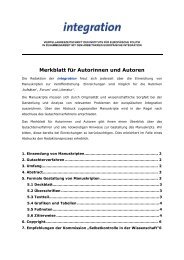
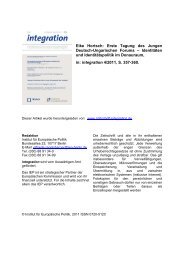
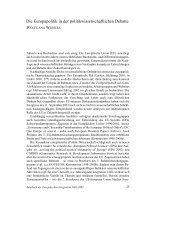
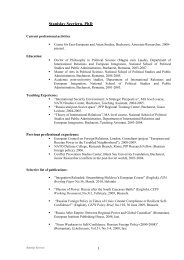
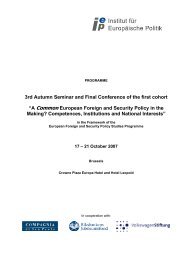
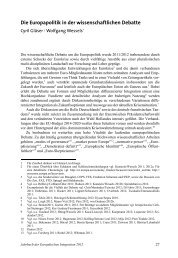
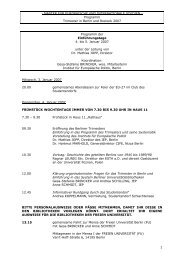
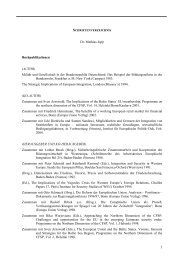
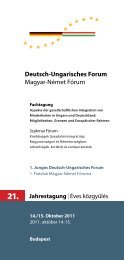
![ausführlichen Bericht zur AG3 - Institut für Europäische Politik [IEP]](https://img.yumpu.com/22513249/1/184x260/ausfa-1-4-hrlichen-bericht-zur-ag3-institut-fa-1-4-r-europaische-politik-iep.jpg?quality=85)
![PDF-Download - Institut für Europäische Politik [IEP]](https://img.yumpu.com/21861061/1/184x260/pdf-download-institut-fa-1-4-r-europaische-politik-iep.jpg?quality=85)
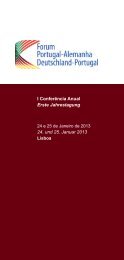
![Recruitment Notice - Institut für Europäische Politik [IEP]](https://img.yumpu.com/21834429/1/184x260/recruitment-notice-institut-fa-1-4-r-europaische-politik-iep.jpg?quality=85)
